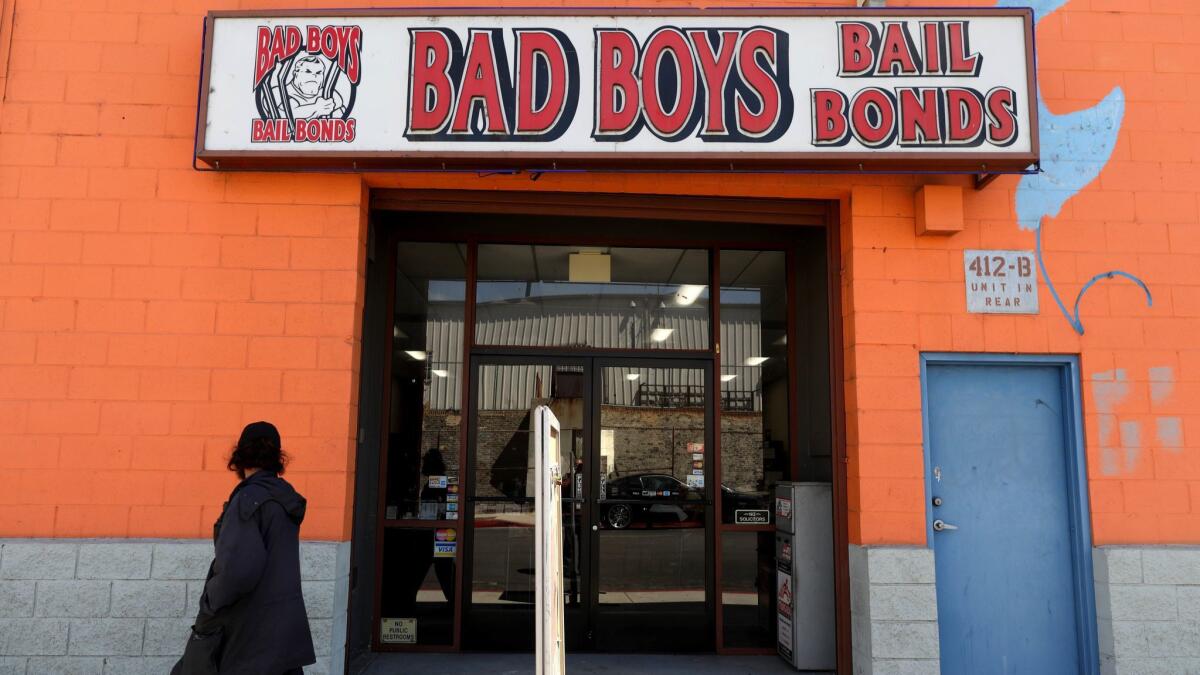Op-Ed: California’s high court has the chance to fix our ‘unsafe and unfair’ money bail system

This year, a landmark case challenging the constitutionality of money bail is expected to come before the California Supreme Court. This is the culmination of an effort to reform the state’s troubled money bail system, pitting justice-reform advocates against the for-profit bail industry.
For a court that tries hard to achieve consensus, this case may present a challenge. Chief Justice Tani Cantil-Sakauye has publicly criticized the money bail system, and Associate Justice Joshua Groban, the newest member of the court, has not previously ruled on bail issues.
The court will review an appellate ruling from last year that involved the bail for Kenneth Humphrey, a retired shipyard worker charged with threatening and stealing $5 and a bottle of cologne from an elderly man. A trial court judge had initially set bail at $600,000, but it was lowered to $350,000 after Humphrey demonstrated a willingness to undergo treatment for drug addiction.
Keeping people in jail while they await trial is unnecessary in most cases and harmful to them, their families and our justice system.
With the bail still out of his financial reach, Humphrey remained in jail until a three-judge appellate court unanimously ruled that it would violate due process to order a bond that Humphrey could not afford without the court examining his ability to pay and whether other conditions placed on his release might ensure his future court appearances. The appellate court then ordered another bail hearing for Humphrey. At that hearing, Humphrey was not required to post cash bail. Instead, conditions tailored to his case were imposed.
Despite previous court rulings cautioning judges against setting unreasonable bail, the everyday practice in California courts is to set high bail as an easy means of detaining someone in custody while they await trial, rather than deciding on a case-by-case basis whether detention is necessary. Judges have broad authority to craft effective alternatives to money bail, such as ordering close supervision of the defendant during his release. They routinely fail to offer alternatives, leading to the unnecessary detention of thousands of people who could be safely released prior to trial.
Humphrey’s case is an excellent example of this. Once the Court of Appeal required his bail conditions be set according to his ability to pay, the trial court did not impose money bail. Instead, it made residential drug treatment attendance, the wearing of an ankle monitor and compliance with a restraining order the conditions of his release. He has successfully complied with those conditions.
California’s for-profit bail bond industry hopes the state Supreme Court will overturn the lower court’s ruling, opening the door for a ballot initiative fight to reinstate money bail. Money bail was scheduled to end in October, but that has been delayed because the bail bond industry succeeded in getting a referendum on the ballot in 2020 to repeal the new law.
The stakes in this case are high. Fundamental constitutional tenets — the presumption of innocence and the related principle that a person cannot be punished for a crime until convicted — are in question.
Keeping people in jail while they await trial is unnecessary in most cases and harmful to them, their families and our justice system. Unnecessary pretrial detention makes it exceedingly difficult for people to prepare their defense and often leads to more guilty pleas if a sentence for a minor crime is shorter than the time expected to be spent in jail awaiting trial. Just because this is accepted as common practice does not make it constitutional.
The long-term effects of pretrial detention have been well documented. Time behind bars causes people to lose their jobs and jeopardizes their financial stability and public safety. Children can suffer irreparable trauma when separated from a parent who is in jail.
The right to release a defendant on bail has been preserved in the California Constitution since its adoption in 1849. Should the state Supreme Court reverse the appellate court’s ruling, it could result in effectively undermining the right to bail — even for defendants charged with minor offenses — if judges need not consider whether those defendants can afford the bail amount that is set.
Of course, if the Supreme Court upholds the lower court ruling, it will need to contend with another question: How should the law define a person’s ability to pay? For equal treatment under the law to prevail, “ability to pay” must mean a person can pay the full bail amount out of personal assets. That means being able to meet bail without paying a fee to a bail agent, or without causing undue hardship to the person jailed or their family in terms of being able to pay for life’s basic necessities — food, clothing, medical care, transportation, shelter.
Enter the Fray: First takes on the news of the minute from L.A. Times Opinion »
What is not in dispute in this case is a judge’s obligation to consider both public safety and flight risk when determining whether someone can be released on bail prior to trial.
The state Constitution, which prohibits excessive bail and guarantees Californians the absolute right to pretrial release on bail, provides ample authority for judges to order detention in cases where an individual has been charged with a capital offense or felony involving acts of violence or sexual assault, or where the individual poses a physical threat to the safety of another. Public safety will remain paramount regardless.
While the outcome of this case is hard to predict, its implications — and this court’s legacy — will be far-reaching.
In the past, Chief Justice Cantil-Sakauye has called the money bail system “outdated, unsafe and unfair.” Soon, she and the other members of the court will have the chance to change that.
Laurie L. Levenson is a professor of law at Loyola Law School and a former federal prosecutor.
More to Read
A cure for the common opinion
Get thought-provoking perspectives with our weekly newsletter.
You may occasionally receive promotional content from the Los Angeles Times.






